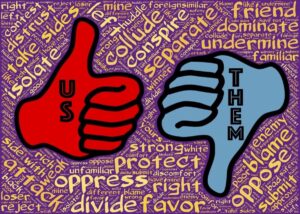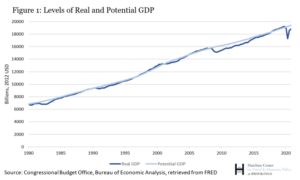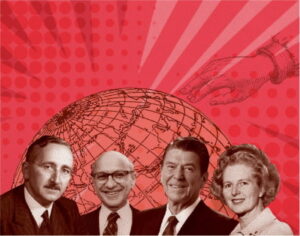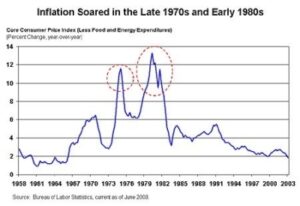This post is part of a series of posts that summarizes the book Angrynomics by Eric Lonergan and Mark Blyth.
If you found this post via search, it probably makes sense to start with the link to the full series, which is both here, and above.
Table of Contents
Angrynomics and politicians fueling the sense of “us” vs “them”
And then politicians not only start to speak rhetorically about who is “us” and who is “them”, but they also start to implement policies that look suspiciously like robbing Peter to pay Paul.
And if you feel you’re in the group being robbed, that is definitely not a good look.
UK: University tuition exists now due to privatization
In the UK, universities are increasingly privatized, which means students now pay tuition, which they didn’t use to.
To the UK government, which previously funded this spending, this represents savings.
Where are those savings being spent? In the NHS (National Health Service).
Who goes to university? Mostly young people.
Who uses the bulk of NHS resources? Mostly old people.
This looks like a generational transfer of wealth, from young people to old people.
Why does this make sense?
Well, old people do vote at twice the rate of young people.
Germany: No resources to help struggling Germans
After 2008, German residents, like residents all over Europe, are increasingly financially stressed. Big banks and big businesses get bailed out quickly, while German households don’t.
In fact, the German government prescribed austerity, which took money away from programs to help households, and this after spending 3% of GDP on the great financial crisis fiscal stimulus.
Then migrants start showing up.
And suddenly there are resources with which to help them.
But, if there are resources to help migrants, how were there NOT resources to help German households?
USA: Americans are struggling
Same story in the USA.
Small businesses and households most definitely did NOT get bailed out after 2008.
Big banks and other big businesses did.
Then migrants start coming across the southern border in record numbers, and apparently, we’ve got resources to help them.
The political narrative is they get “free stuff”.
But that “stuff” was not available to help American households and small businesses a few years previously.
Nationalism fueled by anger
And angrynomics starts to fuel nationalism.
- Brexit happens
- Donald Trump happens
- Bolsonaro happens
- Viktor Orban happens
To borrow a line from the 1976 movie Network “We’re mad as hell and we’re not going to take it anymore”!
Economic triggers
All this from economic mismanagement? Extreme wealth and income inequality? And a clearly corrupt set of political and economic elites?
Absolutely!
But, there is no competing economic narrative “ready to go”
And therein lies the rub.
Unlike when capitalism 2.0 broke in the 1970s, there is no “script” ready to replace it.
There is no competing narrative and outline of policy options standing by.
So we have a void, which filled with anger.
Parts of capitalism V3.0 are worth keeping
Specifically low inflation and heavily regulated banks (such as exists in Canada and Australia).
As for heavily regulated banks, that’s pretty simple. To borrow a phrase from Nike “Just do it”!
As for low inflation, we’re not actually sure what causes inflation, believe it or not.
So this one may not be as easy.
Banks need financial buffers
If there is one thing we’ve learned from the post-2008 financial crisis and the financial crisis from Covid, it’s that banks need financial buffers which carry them over during periods when they get low on cash.
As banking is integral to modern society, and we can’t just let our payment processing systems grind to a halt, we can’t allow banks to simply stop banking.
But we also can’t continue to let them gamble with other people’s money. Because when they lose they lose big, and then we need to inject massive amounts of “public money” into ensuring our payment systems continue to allow us to process payments.
Money that in theory could have been better used elsewhere.
Inequality undermines democracy
But perhaps most important of all is that extreme inequality is fundamentally incompatible with democracy.
When a fairly small group of people are so enormously rich that they have more of our policymaker’s and lawmakers attention, what they individually think makes sense becomes official policy.
A specific case in point now, that didn’t exist when the book was published, is our need to produce a massive quantity of vaccines for Covid 19.
There are two ways to proceed.
Companies who own patents can license the patents to vaccine manufacturing labs around the world, and we can greatly amplify the quantity of vaccines being made by doing this.
Or the companies that hold the patents can ramp up vaccine production as best they can and everyone who needs their vaccines will buy them from the vaccine patent holders.
We’re doing the latter.
Why? Apparently, because Bill Gates says we must protect the intellectual property of the patent holders.
Why does Bill Gates get such an outsized voice?
Because the Bill and Melinda Gates Foundation is such a massive funder of vaccine research around the world.
I’ve heard he’s a smart guy, and I’m glad their foundation funds so much vaccine research, but should one person be able to effectively appoint themselves the global vaccine Czar?



